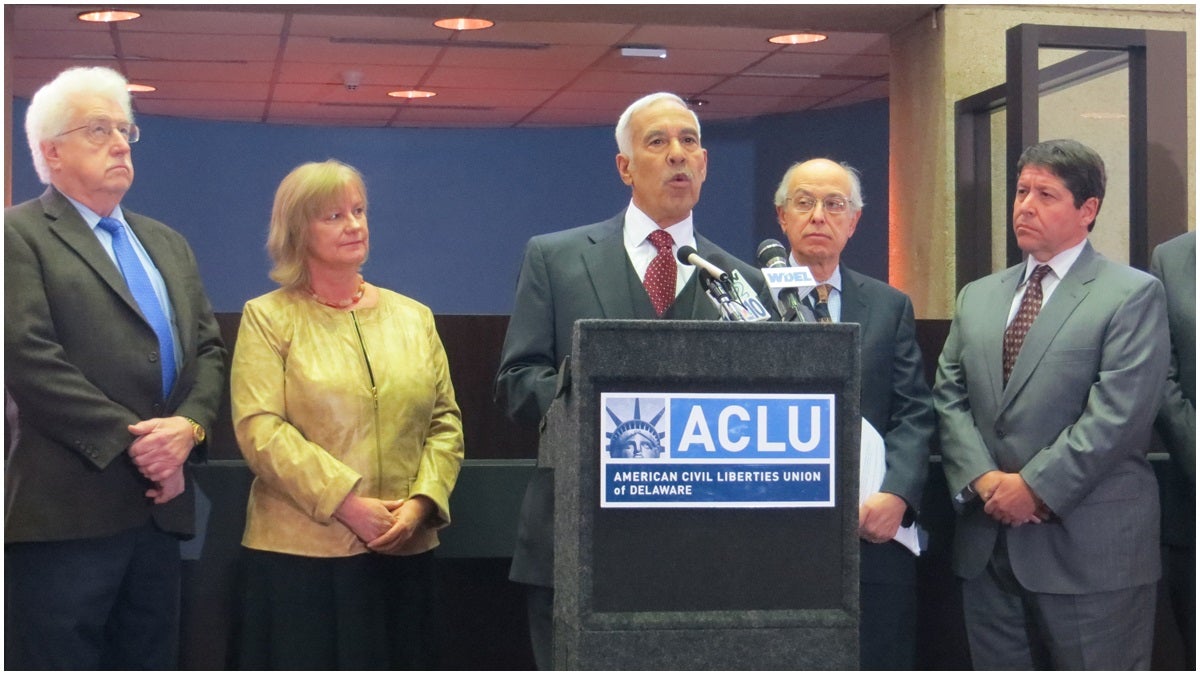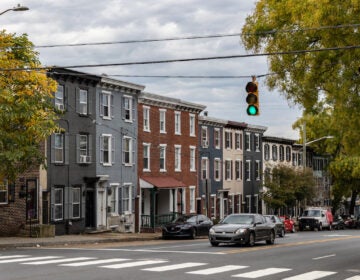Delaware charters fuel segregation, ACLU says

New Castle County Councilman Jea Street addresses racial segregation in Delaware charter schools. (Shana O'Malley/WHYY)
A complaint is filed against Delaware charter schools Wednesday. Details and reaction are here.
Delaware’s charter policies contribute to racial segregation and violate federal law, according to a complaint filed Wednesday with the U.S. Department of Education by the American Civil Liberties Union and the Community Legal Aid Society.
The 40-page complaint says that 76 percent of Delaware charter schools are “racially identifiable,” and that high-performing schools are largely white, while low-performing schools tend to serve lower-income students of color.
The plaintiffs blame Delaware’s charter law for this disparity, arguing that it allows charter schools to create prohibitive requirements during the application process. They claim those requirements end up disproportionately excluding low-income applicants, minority applicants, and students with disabilities.
“Charter schools are supposed to be about choice for families,” said Kathleen MacRae, executive director of the ACLU of Delaware. “But this broad authority over the admission process means that it is the charter school that is making the choice.”
The resulting segregation violates the Civil Rights Acts of 1964 and the Rehabilitation Act of 1973, say the plaintiffs. To remedy the situation, they suggest the state issue a moratorium on new charter schools until it establishes a desegregation plan; implement a randomized lottery system of charter school admissions; and provide extra money to schools with high portions of minority, low-income, and special-needs students.
‘There’s nothing equal about it’
Politicians are echoing the ACLU. New Castle County Councilman Jea Street said existing racial segregation mirrored conditions prior to the 1978 court order that instituted a desegregation plan for New Castle County. “If I compare what was in place for African-American children from 1974 to now, I don’t see the progress,” Street said.
The Brown v. Board of Education decision “said separate but equal is inherently unequal. And if you look at the charter school makeup — the predominantly white charter schools versus the low-income, primarily African-American charter schools — there’s nothing equal about it,” he said later.
The complaint singles out three high-performing charter schools — the Charter School of Wilmington, Sussex Academy, and Newark Charter School — as the “most extreme examples of the segregation that Delaware’s charter policy has engendered.”
It takes special exception with the application process at The Charter School of Wilmington, which includes a placement test, teacher recommendations, and a student essay.
The Charter School of Wilmington is 65 percent white, while the surrounding school district is just 44 percent white. The U.S. Department of Education considers a school “racially identifiable” if there is a 20 percent difference between its enrollment and overall district enrollment for a particular racial group.
Investigations ongoing
Earlier this year, the U.S. Department of Education’s Office of Civil Rights opened three investigations following complaints filed by parents in Chicago, New Orleans, and Newark, New Jersey. Each of those cases involved the closure of traditional public schools in favor of charter schools and the disproportionate effect of those closures on African-American students.
ACLU staff attorney Courtney Bowie, who said this is the first time her group has taken on racial segregation as it relates to charter law, said other cases could be forthcoming in other states.
MacRae of the ACLU of Delaware said a formal investigation by the U.S. Department of Education could follow the complaint, but it may be months before the federal government determines a course of action.
Charter schools respond
Charter advocates rejected the notion that their schools disadvantage students of color. “We have a number of charter schools that enroll a majority of African American and Hispanic students, and low-income students, and these schools are doing well and/or their test scores are improving,” said Kendall Massett, executive director of the Delaware Charter School Network, in a statement. She cited Kuumba Academy Charter School in Wilmington, ASPIRA Academy Charter School in Newark, and EastSide Charter School in Wilmington as examples of successful charter schools that serve minority students.
Of Delaware’s 21 charter schools, just over half have a minority enrollment of over 50 percent according to state figures.
WHYY is your source for fact-based, in-depth journalism and information. As a nonprofit organization, we rely on financial support from readers like you. Please give today.




